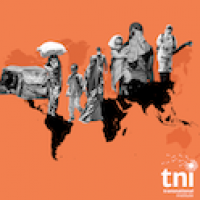Summary: The coming global recession webinar Building an internationalist response
Temas
The second webinar in our weekly series on COVID-19 focused on the unprecedented economic impacts of the pandemic, particularly on the Global South. A number of questions were addressed, including: How can we advance a progressive and transformative economic response that learns from our failures during the 2008 economic crisis? How can we deal with this pandemic as it unfolds both as a health issue and in terms of the underlying structures of injustice that have exacerbated the problem? How can we mobilize to influence financial institutions like the International Monetary Fund (IMF)? How can citizens be active and instrumental in their own emancipation considering the existing power structures and increasing authoritarianism?

Our expert international panellists outlined pressing issues from their respective standpoints. The presentations and discussion provided a comprehensive global overview both in terms of problems we are facing and necessary solutions.
Key issues
-
Simultaneously shutting down large parts of the global economy under lockdown policies will, as well as ceasing demand, reduce supply, break supply chains and disrupt distribution. Many countries will soon face shortages of necessities.
-
The range of global trade exports has collapsed and the halt of global economic activity is greatly affecting the balance of payments of countries in the Global South. This will lead to negative multiplier effects as the loss of income and demand will persist and feed into further loss over time.
-
Flight of capital from all emerging markets has affected stock markets as well as financial conditions within countries.
-
Extended volatile borrowing resulting in the collapse of the bond markets in most emerging markets and the rapid depreciation of currencies is making it harder to service external debt.
-
Existing inequalities are now intensified. The assertion of the worst kinds of global power as well as global and within-country inequalities will result in direct effects on the most marginalized and least protected workers.
-
Due to the disruption of the agricultural supply chains created by transnational corporations, an impending food shortage will be the second or third phase of this deepening crisis.
-
People will not accept indefinite lockdowns without access to food, leading to conflict on the streets. A political crisis sparked by opposition to authority will also have an impact on how we deal with this economically.
-
Regions including Europe, America and China have been exposed as fragile and subject to increasing economic chaos, in turn affecting the Global South. Defaulting on credit, habitual lending and state-owned funds investing in assets are some of the Global Northern economic strategies being used to readjust that prove problematic when applied in the South.
-
The virus will act as a worrying dynamo, speeding up existing political tendencies towards authoritarianism which we can see illustrated by regimes enforcing draconian measures to strengthen state control under the guise of dealing with the emergency.
-
Projects with a developmentalist mindset, for example China’s Belt and Road Initiative (BRI) have no respect for the planet and as a result of massive infrastructure development will introduce an estimated 800 million species into unfamiliar habitats. This will create ecological destabilization in many regions and the ideal conditions for further virus transmission between species.
Solutions
-
Despite neoliberal financial controls and nationalist leadership, an unprecedented global response is necessary. Big gestures, implemented at speed.
-
The recognition we are seeing of the importance of public health does give us hope that public health spending will increase. This is essential to save the developing world from economic disaster.
-
Immediate global demands must be made from the IMF, an institution that has the mandate to create global liquidity. We need at least around a 1.5 trillion increase in special drawing rights (SDRs), assets that the IMF has the power to create and give to countries solely based on their share of the fund’s quota and without conditions attached. For developing countries they could be a lifeline.
-
Most debts of the developing world are currently unpayable so an immediate six-month moratorium on all debt repayments, without added interest payments, is fundamental. Subsequent restructuring of all debt packages must follow, as most will remain unpayable after the six-month moratorium.
-
Currencies of the Global South have depreciated by 10-30% in the last month. Instituting coordinated capital controls will ensure that money cannot move in and out impulsively.
-
Careful state planning and coordination is required due to the nature of the concurrent supply and demand crisis. Bringing back the production and distribution of necessities needs to be planned with consideration of input and output relationships.
-
Producing fish in the North Sea that is then processed in South East Asia and sent back to Europe for consumption is just one example of the absurdity of globalization. Attention must be focused on the local, both in terms of more sustainable production and consumption as well as building on neighborhood infrastructure levels of care and provisioning.
-
There must be strict conditions to bailouts and the so-called stimulus packages already making their way through the US: a prohibition on bonuses, share buybacks, and dividends; worker representation on boards; oversight for the resources and assets that are now becoming government-owned.
-
Redirection of state responses, concentrating on how we can seize increasing state capacity should be aimed in an activist, progressive direction including civil society focused macroeconomic measures. How can we rethink what states actually are and what we expect of them? If we can capture a few demands that are impossible to ignore we can insist on a global context that enables their realization.
-
Radical rethinking of how we can organize a socialist, feminist and ecologically conscious economy is the way forward. Increasing pressure on social spending, recognizing the importance of care, and pushing towards green infrastructure based on a carbon-neutral model are all important. How can we reframe the values of the economy, markets, states and personal autonomy in the context of reciprocity of benefits, production, goods and services?



